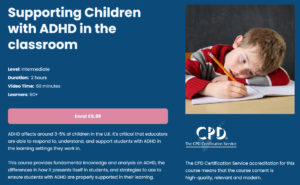ADHD Course: Why Supporting ADHD in the Classroom Matters
Attention Deficit Hyperactivity Disorder (ADHD) is a prevalent neurodevelopmental condition impacting millions of children in the U.K. and worldwide.
Students with ADHD often grapple with challenges in focus, organisation, and impulse control, which can significantly hinder their academic performance and their school engagement.
It is essential to discuss ADHD, including its definition and impact on students, to better understand and address these challenges.
Overlooking or neglecting ADHD support in the classroom has far-reaching consequences that extend beyond exam results and school life.
Additionally, it is important to discuss wider issues related to ADHD, such as stigma and prevalence, to foster a more inclusive and supportive educational environment.
Prioritising support for students with ADHD in the classroom is crucial for the overall well-being and future success of all learners in the vicinity.
Enrol in our online course 'Supporting Children with ADHD in the Classroom'

Take our online Prospero Learning course, Supporting Children with ADHD in the classroom.
Students with ADHD often experience frustration and discouragement when traditional learning methods prove difficult, hindering their educational and personal development. Without proper support, they may develop a negative self-image and a sense of inadequacy.
Implementing classroom strategies that are inclusive of students with ADHD empowers them to grasp concepts, complete tasks, and experience the joy of academic achievement in the same way as all other students.
This helps to build their confidence, fosters a growth mindset, and unlocks their full potential.
Creating positive social habits by understanding protective and risk factors
The challenges associated with ADHD can sometimes lead to social difficulties. Students with ADHD can struggle to follow social cues, exhibit impulsivity, or have difficulty staying focused during group activities.
A supportive classroom environment that caters to their needs fosters positive social interactions by implementing practical strategies.
It teaches valuable social skills, builds self-regulation techniques, and promotes a sense of belonging within the classroom community. Relevant support services can also aid in building these social skills.
These social skills outlast the school journey and set out a concrete building block for adult life.
Empowering self-advocacy and life-long skills
Learning to manage their own ADHD symptoms is a valuable skill that translates far beyond the classroom.
By providing students with tools and strategies to manage their focus, organisation, and impulses, educators empower them to become self-advocates. It is crucial to evaluate practical strategies for managing ADHD symptoms to ensure their effectiveness.
These skills then translate into better time management, improved study habits, and a greater sense of control over their academic and personal lives. Staying updated with the latest ADHD research is also important for effective self-management.

Preventing further mental health problems and helping overall well-being
Students with unaddressed and unsupported ADHD are more susceptible to developing secondary conditions like anxiety, depression, and low self-esteem, which are significant aspects of mental health.
These conditions can significantly impact their mental and emotional health. ADHD is often discussed within the context of neurodevelopmental, behavioral, and mental health problems, highlighting its impact on individuals and their families. A supportive classroom environment fosters a sense of acceptance and belonging. It equips students with the tools to manage their ADHD symptoms, reducing the risk of secondary conditions and supporting their overall well-being.
Creating a Culture of Inclusion and Understanding
By actively supporting students with ADHD, educators send a powerful message of inclusion and understanding. This creates a positive and accepting classroom environment that benefits all students, including those working with mental health professionals or aspiring to specialize in ADHD within the medical field. It fosters empathy, compassion, and a sense of community within the classroom.
The ripple effect: supporting families and communities
ADHD doesn’t just impact individual students; it affects their families as well.
When children experience academic difficulties and social challenges, family dynamics can become strained due to the genetic and environmental vulnerability associated with ADHD. Providing effective classroom support eases some of that burden by equipping students with the tools they need to succeed.
Evaluating the biological and environmental risk factors for ADHD is crucial as it helps in understanding the disorder’s impact on families. This fosters a more positive and collaborative relationship between educators, parents, and students.
Do you need attention deficit hyperactivity disorder training?
Prospero Learning’s accredited course provides fundamental knowledge and analysis on ADHD, critically assessing key factors such as conceptualization, understanding, evidence base for interventions, risk factors, and support services.
The course also describes core principles, tools, and techniques used in the screening and diagnosis of ADHD, along with factors that may impact the accuracy of a diagnosis.
Our course is psychiatric research-based, and allows you to learn practical strategies, and critically discuss current evidence
ADHD Courses for Continuing Professional Development
For professionals seeking to deepen their understanding of ADHD mechanisms and best practice treatments, our course offers comprehensive training. Covering topics such as psychosocial treatments, neurological mechanisms, and evidence-based approaches, this course equips participants with the latest research and practical tools for supporting individuals with ADHD.
Identify Resources for ADHD Diagnosis and Treatment
Our course goes beyond theoretical knowledge to identify resources for ADHD diagnosis and treatment. From understanding diagnostic criteria to exploring pharmacological and non-pharmaceutical interventions, participants gain insight into best practices and emerging controversies related to ADHD management.
Understanding ADHD from Multiple Perspectives
Featuring fundamental information on ADHD, our course integrates multiple perspectives, including those of educators, healthcare professionals, and researchers. By examining the core challenges faced by individuals with ADHD and their close family members, participants gain a holistic understanding of the disorder and its impact on various aspects of life, including education, relationships, and mental health.
Enrol in our ADHD course today to gain full details on the latest research, best practices, and strategies for supporting individuals with ADHD in educational settings.
Teaching Blog
No results found.....